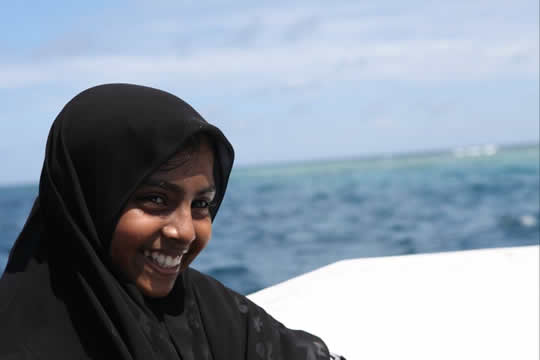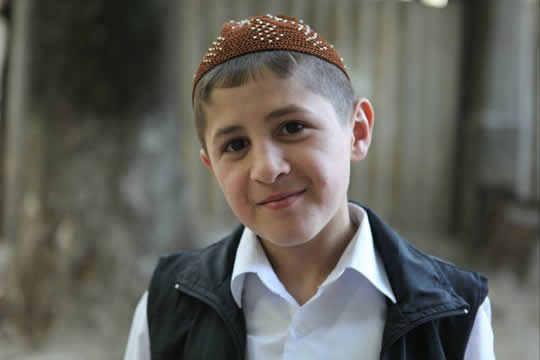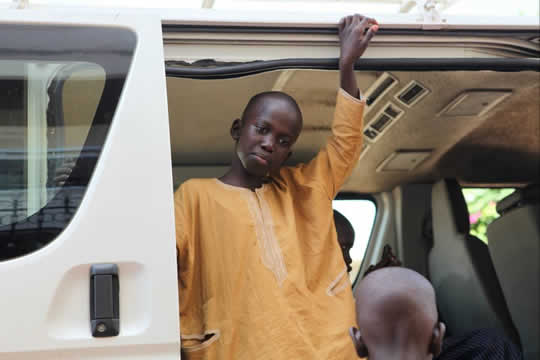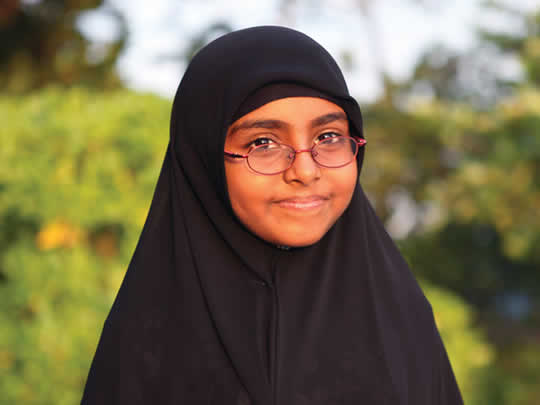 Koran By Heart is about three 10-year-old kids – two boys and a girl – who come from all over the Islamic world to compete in Cairo’s prestigious Koran-recitation contest during Ramadan. The recitation of the Koran is a revered and deeply religious tradition, and this “Olympics of Koranic recitation” draws Muslim children from over 70 countries around the world.
Koran By Heart is about three 10-year-old kids – two boys and a girl – who come from all over the Islamic world to compete in Cairo’s prestigious Koran-recitation contest during Ramadan. The recitation of the Koran is a revered and deeply religious tradition, and this “Olympics of Koranic recitation” draws Muslim children from over 70 countries around the world.
Nabiollah from Tajikistan, Djamil from Senegal and Rifdha (one of the few girls participating) from the Maldives must memorize 114 chapters, over 6,200 verses, and 200,000 words in Arabic – and not one of them is a native Arab speaker. Moreover, the text is in ancient Arabic and is actually “sung” with improvised melodies; participants are judged on their competence, but also on the passion and beauty of their recitation.
A former freelance journalist and war correspondent, director Greg Barker has seen firsthand the international struggles within modern Islam, a community of 1.6 billion people. With Koran By Heart, he not only creates a vibrant, entertaining look at this one-of-a-kind competition, but also captures the unique challenges faced by parents and the next generation of Muslims as they struggle to find the right balance between the secular and religious elements of their lives.
Bijan Tehrani: My first question is how did you come up with the idea of making Koran By Heart?
Greg Barker: Well, over the course of my career I have spent a lot of time traveling in Muslim countries in the Middle East and also elsewhere throughout the Islamic world, making political films and stories and issues of the day. I was intrigued by the conversation that I was having with Muslims of all political persuasions and all points on the spectrum of political views, I was intrigued by the conversations they were having about the future of Islam and I talked to a lot of people and I was interested by this struggle over the future of the faith and the conversation that was happening within Islam over whether or not to embrace modernity or adopt a more fundamentalist approach. This discussion is not fully represented in the western media and I thought it was important for us to understand that, so I looked for a way into that issue and really it kind of settled on the idea of doing a film about a Quran reciting competition as the most accessible and most engaging story, and filming the most interesting way into the deeper issues that I have been grappling with. It is about the kids, though the kids are not political themselves, and their own journeys of a lifetime from their own countries to this huge competition in Cairo. At the same time we were able to get into their families and have them talk openly about the issues that they are struggling with and grappling with over the role of education and the role of religion and their own education. That kind of opened a window into the next generation of Islam through the course of the film. So it began with this big idea of a question where I started to look into this world, and ended up into something very specific: a Quran reciting competition for kids, which works as a story but also holds a deeper purpose.
BT: Koran By Heart shows a positive face of Islam, was this done intentionally? GB: I just wanted to put a human face on Islam, mostly for a non-Muslim western audience. I mean, the response among Muslim Americans has been overwhelming and very positive, but I really just wanted to demystify Islam and the culture and religion. I wanted a just observational or neutral view, I have made films where I have interviewed Jihad terrorists, so I am very aware of that serious threat, I just know from my own travels that there are 1.6 billion Muslims in the world, most of them are not terrorists, and there is a whole spectrum of belief in this faith and there is a widely divergent view about what the faith means. I just want to put a human face on that and not represent a threatening or militant view of Islam. I’m providing an image that some people might not have in their minds, so I am just trying to represent it in all of its complexity and avoid minimizing Islam. I want audiences to understand what this religion means and how it might impact us, you need to start focusing on individuals and that world in all of it nuance and complexity.
GB: I just wanted to put a human face on Islam, mostly for a non-Muslim western audience. I mean, the response among Muslim Americans has been overwhelming and very positive, but I really just wanted to demystify Islam and the culture and religion. I wanted a just observational or neutral view, I have made films where I have interviewed Jihad terrorists, so I am very aware of that serious threat, I just know from my own travels that there are 1.6 billion Muslims in the world, most of them are not terrorists, and there is a whole spectrum of belief in this faith and there is a widely divergent view about what the faith means. I just want to put a human face on that and not represent a threatening or militant view of Islam. I’m providing an image that some people might not have in their minds, so I am just trying to represent it in all of its complexity and avoid minimizing Islam. I want audiences to understand what this religion means and how it might impact us, you need to start focusing on individuals and that world in all of it nuance and complexity.
BT: How has the reaction of non Muslim audiences that have seen the film?
GB: You know we premiere on HBO on Monday, so we will find out. We have shown it at a handful of film festivals: we premiered it at the tribeca film festival in New York in April and the audience response was overwhelming! Out of one hundred and twenty films in the festival in was in the top ten for the audience award, so people just responded incredibly positive to this. I think its just because the stories we feature are so compelling and the stories we tell are so engaging, charming and so smart, that basically it works on that very human level. Coming into the film, most people don’t know anything really about what Islam is beyond news headlines, they just get caught up in the story of these kids and this competition and all of the pressures that come with a competition like that. So you feel for these kids and their triumph and it works on that level, and that’s how people like it.
BT: How challenging was it to make this project?
GB: The biggest challenge that my team and I faced was overcoming the skepticism from, first, the organizer of the competition, and then the families themselves who were wondering why I—non-Muslim filmmaker—was making this movie. They were really concerned about our intentions and wanted to make sure that we did not distort Islam. My response was that I am here to tell your story and convey your world to a Western audience so they can understand your world better and help the wider culture understand Islam a little better. Once we got past that hurdle, then the mixed challenge was just building trust with the young kids and having fun with them; making sure they feel comfortable and not threatened. When you work with any subject, they have to feel comfortable for their true emotions to come out, and it was an amazing experience.
BT: Any future projects lined up with similar goals?
GB: No, I am still looking for compelling stories from around the world that help explain the world better to American audiences, but I am not looking to do another film like this. For me I have done a lot of investigative films because it is a complete leap into the unknown: we had no idea about whether a film about a Quran reciting contest would work, and they trusted me and my team because it is such a different world from what people are used to, so it was very spontaneous and we had these wonderful kids, and they made our time magical.

